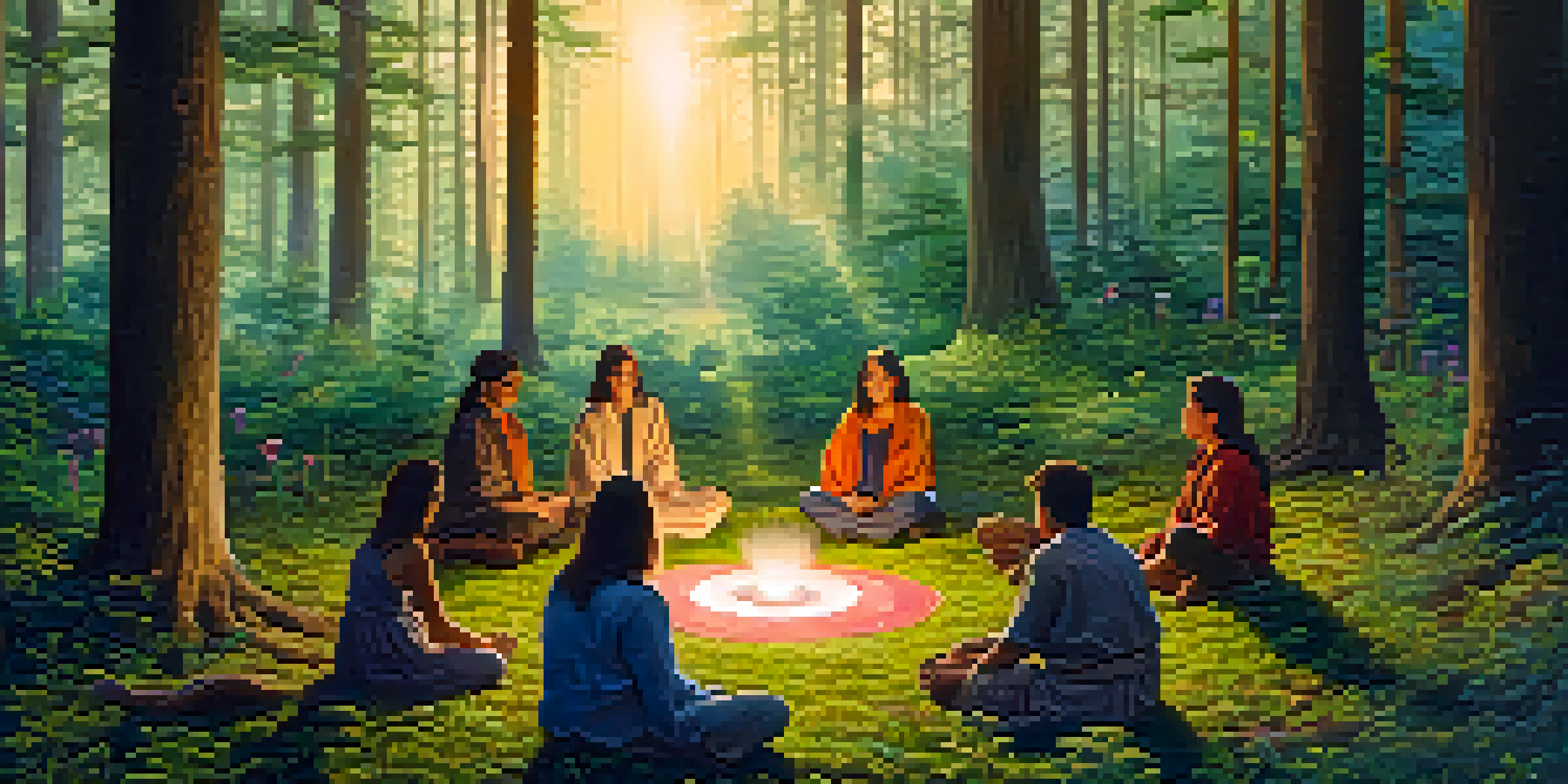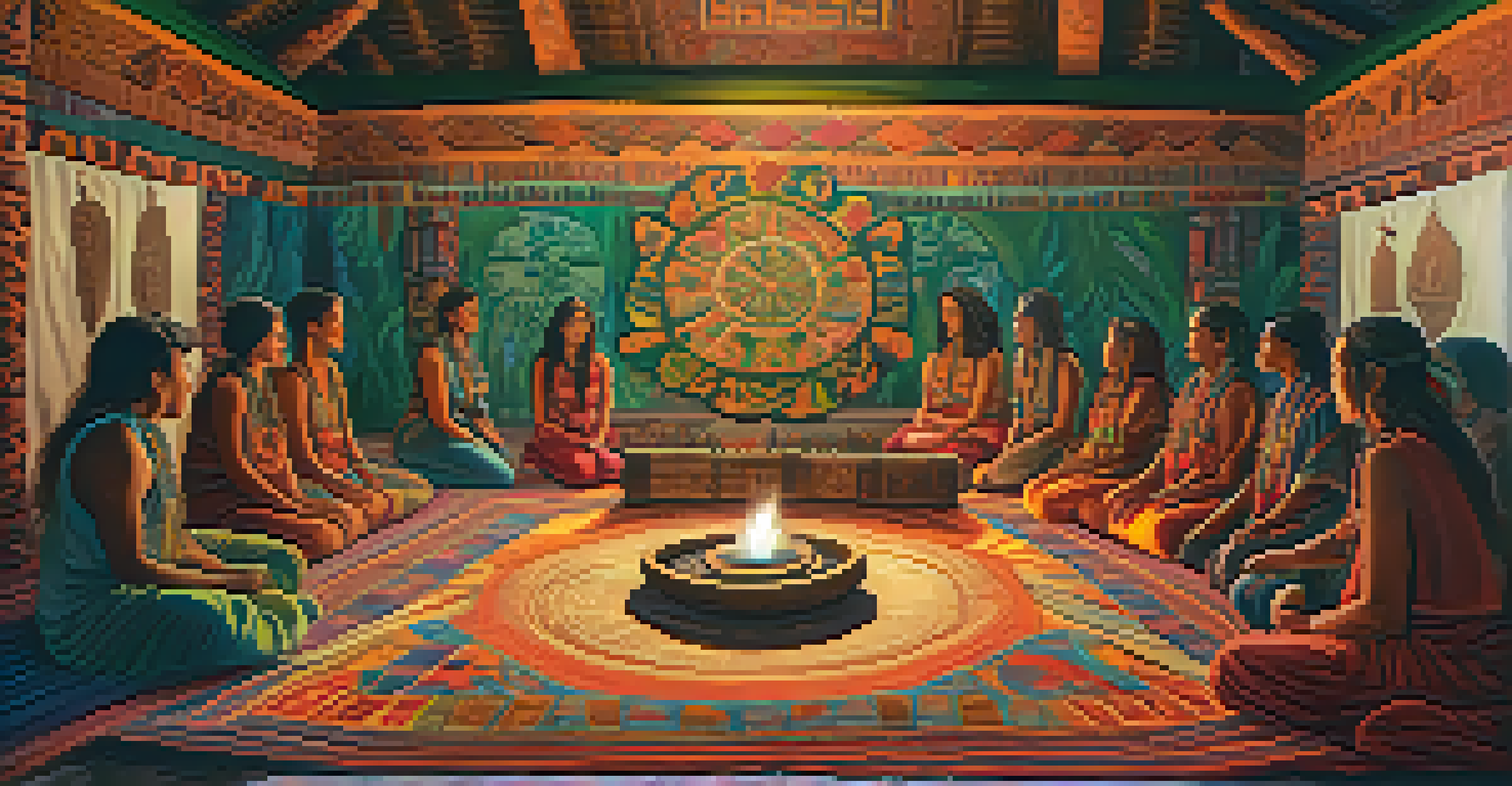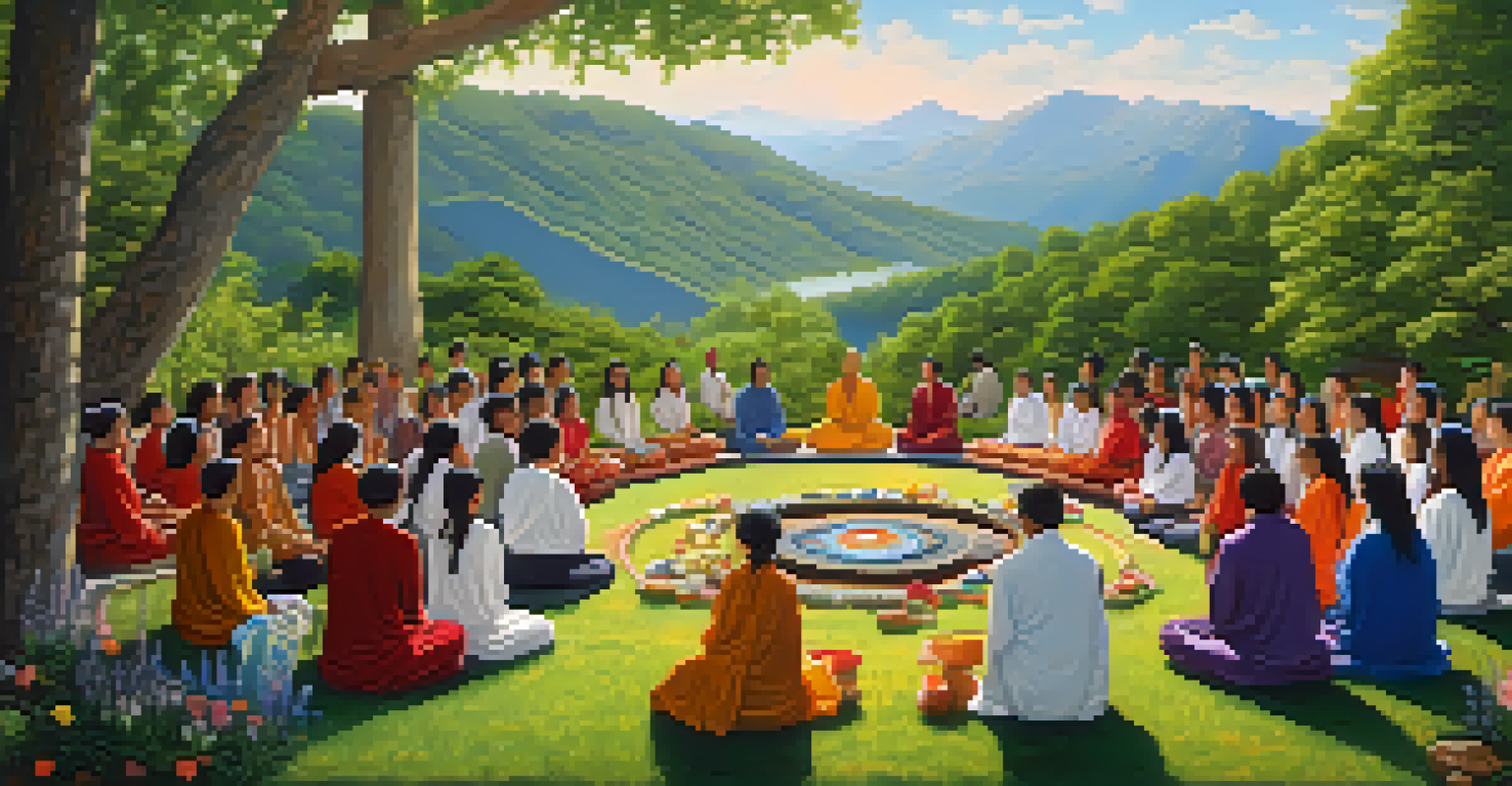Cultural Perspectives on Entheogens and Blissful States

Understanding Entheogens: A Global Perspective
Entheogens, often seen as sacred plants or substances, have been used for centuries across various cultures to induce altered states of consciousness. These natural compounds, like peyote or ayahuasca, are integral to spiritual practices, allowing individuals to connect with the divine or explore their inner selves. In many indigenous cultures, entheogens are not merely recreational; they serve as essential tools for healing, guidance, and community bonding.
The use of entheogens can catalyze profound transformation and healing, providing insights into the nature of consciousness and the interconnectedness of all life.
For instance, among the Native American Church, peyote ceremonies are a profound spiritual experience that fosters emotional healing and communal unity. Similarly, in South America, ayahuasca rituals are often conducted by shamans to provide insight and facilitate personal transformation. These practices highlight a deep respect for the power of nature and its role in human spirituality.
Moreover, as modern society reconnects with these ancient traditions, there is a growing interest in understanding how these substances can contribute to mental health and well-being. This resurgence sparks conversations about cultural appropriation, authenticity, and the ethical implications of using entheogens outside their traditional contexts.
Blissful States: Cultural Interpretations and Experiences
Blissful states, often induced by entheogens, are perceived differently across cultures. While some view these experiences as a means to achieve enlightenment, others see them as pathways to personal and communal healing. In cultures that embrace these practices, bliss is often intertwined with a sense of connection to the universe, nature, and others, creating a holistic understanding of well-being.

Take, for instance, the Buddhist perspective on bliss achieved through meditation and mindfulness. Here, the focus is on internal peace and the dissolution of the ego, which parallels the experiences reported by users of entheogens. This shared goal of transcending the self highlights a universal human quest for happiness and fulfillment.
Entheogens and Cultural Significance
Entheogens serve as sacred tools in various cultures for healing, community bonding, and spiritual exploration.
As we explore these cultural interpretations, we begin to appreciate how blissful states can serve as bridges between diverse philosophies and practices. This exploration invites us to consider how the quest for happiness is both a personal journey and a collective experience that transcends geographical and cultural boundaries.
Historical Context: Entheogens Through the Ages
Historically, entheogens have played a significant role in shaping spiritual and cultural practices across the globe. From ancient Egyptian rituals involving blue lotus to the use of mushrooms in Aztec ceremonies, these substances have been integral to human civilization's quest for understanding the divine. This historical context reveals not just their spiritual significance but also their role in social cohesion and cultural identity.
Cultural appropriation occurs when a dominant culture takes elements from a marginalized culture without understanding or respecting the significance of those elements.
In many cultures, the rituals surrounding entheogen use were often complex, with deep-rooted traditions passed down through generations. These practices provided frameworks for understanding life's mysteries, addressing existential questions, and fostering community ties. They were not merely about the substances themselves but the sacred contexts in which they were used.
As modern society grapples with mental health challenges, revisiting these historical practices can offer valuable insights. By understanding how our ancestors navigated altered states of consciousness, we can glean lessons about balance, respect for nature, and the importance of community in our own journeys toward bliss.
Scientific Insights: The Psychology of Blissful States
Recent scientific research has begun to unravel the psychological mechanisms behind blissful states induced by entheogens. Studies have shown that these substances can alter brain chemistry, often leading to profound feelings of empathy, interconnectedness, and emotional release. This aligns with many cultural narratives that describe entheogenic experiences as transformative and healing.
For example, research on psilocybin, the active compound in magic mushrooms, has demonstrated its potential to alleviate depression and anxiety by promoting increased emotional openness and cognitive flexibility. These findings not only validate traditional practices but also encourage a dialogue between science and spirituality in understanding consciousness.
Blissful States Across Cultures
Different cultures interpret blissful states induced by entheogens as pathways to enlightenment, healing, and connection.
Moreover, exploring these psychological effects can help destigmatize the use of entheogens in therapeutic contexts. As more people recognize the potential benefits, we may see a growing acceptance of these ancient practices in modern medicine, paving the way for new approaches to mental health and well-being.
Cultural Appropriation vs. Appreciation in Entheogen Use
As interest in entheogens grows in Western cultures, the conversation around cultural appropriation versus appreciation becomes increasingly important. Many indigenous groups express concern that their sacred practices are being commodified and stripped of their cultural significance. This raises crucial questions about respect, authenticity, and the ethical implications of using these substances outside their traditional contexts.
Appreciation involves recognizing and honoring the cultural significance of entheogens, understanding their historical roots, and approaching their use with humility and respect. Conversely, appropriation often disregards these cultural narratives, leading to a superficial engagement that can harm the very cultures that have preserved these traditions for centuries.
To navigate this complex terrain, it’s essential for those interested in entheogens to educate themselves about their cultural backgrounds, seek guidance from indigenous communities, and engage in respectful dialogue. By doing so, we can foster a deeper understanding of these powerful tools while honoring the cultures that have long revered them.
Modern Movements: Entheogens in Contemporary Society
In recent years, there has been a resurgence of interest in entheogens within modern society, often associated with movements aimed at mental health awareness, personal growth, and spiritual exploration. This revival can be seen in the growing number of retreats, workshops, and research studies dedicated to exploring the therapeutic potential of these substances. As individuals seek alternative paths to wellness, entheogens are re-emerging as powerful tools.
The increasing acceptance of entheogens is also reflected in changing legal landscapes, with several regions moving towards decriminalization and legalization for therapeutic use. This shift opens the door for more people to explore these substances within safe and supportive environments, reminiscent of traditional practices that emphasized community and guidance.
Navigating Cultural Appropriation
Respectful engagement with entheogens requires understanding their cultural significance and fostering dialogue with indigenous communities.
However, with this growth comes the responsibility to ensure that these practices remain grounded in respect for their historical and cultural contexts. By fostering a culture of education, awareness, and ethical engagement, we can create a contemporary landscape that honors the wisdom of the past while embracing the potential for healing and transformation.
The Future of Entheogens and Cultural Engagement
Looking ahead, the future of entheogens in society hinges on our ability to engage with these substances respectfully and thoughtfully. As interest continues to grow, it’s crucial to cultivate an environment that values education and cultural exchange, allowing for a deeper understanding of their significance and potential. This includes actively listening to indigenous voices and integrating their wisdom into contemporary practices.
Moreover, as scientific research continues to validate the benefits of entheogens, we have an opportunity to bridge the gap between ancient wisdom and modern science. This collaboration can lead to innovative therapeutic approaches while ensuring that the cultural heritage surrounding these substances is preserved and respected.

Ultimately, the journey toward understanding entheogens and blissful states is an ongoing dialogue that reflects our shared humanity. By approaching this exploration with curiosity, respect, and an open heart, we can create a future that honors the past while enriching our collective experience of joy and connection.